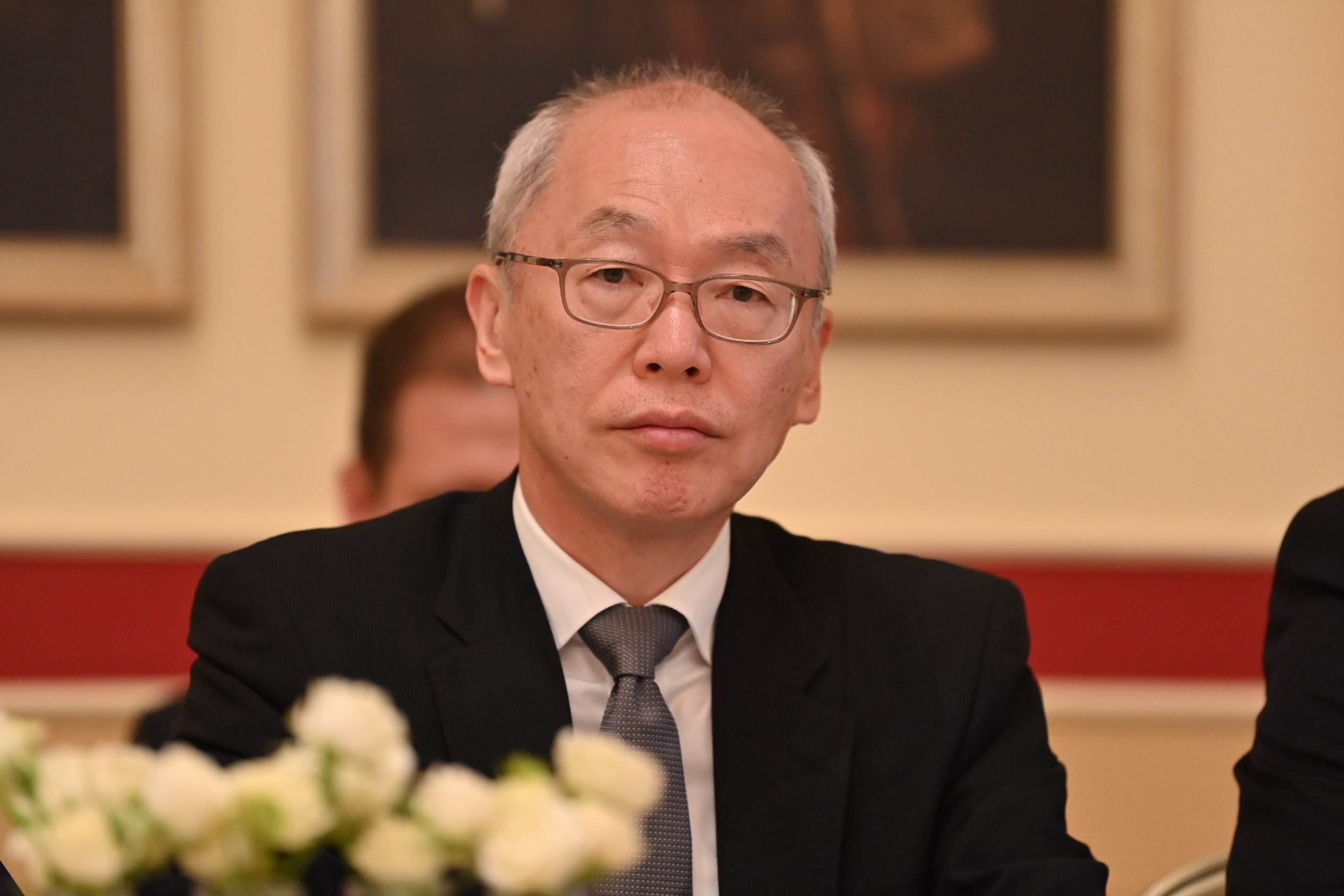Magyar Suzuki Hopes to Increase Auto Production Significantly

Masato Atsumi, CEO of Magyar Suzuki.
Magyar Suzuki finished last year behind its financial plan but managed to increase overall and domestic sales. This year, it plans to invest hundreds of millions of forints, including building a solar park, the company said at a press conference announcing its results.
The global shortage of chips and the difficulties in shipping containers by the sea in the first half of 2021 did not help the Esztergom-based auto manufacturer: the total number of cars produced was 4% below the planned figure. Several shutdowns were enforced, with the shift pattern cut from two to one and only restored at the end of the year.
Despite this, 107,974 vehicles rolled off the production lines in 2021, sales volume reached 120,164 units, and there could be no complaints about sales revenue either, as total sales reached EUR 1.754 billion, of which the Hungarian market generated EUR 264.9 million, Magyar Suzuki Zrt. revealed.
Indeed, total revenue was 6% higher than in 2020, the company’s balance sheet profit was EUR 48.9 mln, and profit doubled. However, as has been the tradition at the Hungarian unit of the Japanese automaker, no dividends were paid. Instead, the profit will be used for new investments, mainly in production and operational processes toward carbon neutrality.
Last year, EUR 92.9 mln of the profit was spent on new investments, a new emissions lab, paint plant modernization, and model development, with around EUR 100 mln planned for 2022, according to Suzuki.
Masato Atsumi, Magyar Suzuki’s CEO, who was appointed a year ago, said that among the main achievements of the past year were the launch of the SX4 S-Cross in October and the start of production of the latest Vitara model with a powerful hybrid system, including a 48-volt electric motor, in November. From the second half of this year, the S-Cross will also be equipped with this powertrain.
Local Autonomy
Atsumi stressed that the travel restrictions of the pandemic meant that the expertise of the local staff played a significant role in the results, with the parent company giving it a great deal of autonomy in production technology development.
Suzuki in Japan increasingly relies on specialists from the Esztergom plant, the third-largest production unit in the group, for more business areas. The entire European market has been supplied with components from Hungary for some time now, but the European IT service center is also located here.
“We were the leader in the Hungarian market for the sixth year in a row, with 17,650 new cars sold, giving us a market share of 14.48%,” said Róbert Krisztián, the operational director responsible for sales and marketing. This exceeds the 2020 sales of 14,783 units. The vast majority of this, 56%, went to corporate and institutional customers and fleet partners.
The most popular new car model in Hungary was again the Vitara, of which 8,350 were sold domestically, and the second most popular was the S-Cross, with 6,261 units sold. The production plan for 2022 is to assemble 147,000 cars, but whether this can be achieved will depend on overcoming semiconductor shortages, the COVID restrictions in the Shanghai region, and the business difficulties caused by the Russo-Ukrainian war.
While domestic delivery times for Esztergom-built models are currently averaging three to four months for dealerships, and they cannot plan production any earlier, customers can expect a longer waiting list of five to six months for imported Suzuki models.
“It is unlikely that we will be able to satisfy customer demand this year fully,” admitted Krisztián in response to a journalist’s question. For that reason, no domestic promotion program is planned. In any case, domestic sales cannot be boosted at the expense of exports at the moment because of the fluctuating demands of the European market.
Although the CEO recalled the company’s philosophy of providing value-for-money vehicles to help customers with mobility at the beginning of the briefing, Krisztián qualified this slightly in response to another journalist’s question. Due to rising costs in the sector (domestic prices are also strongly influenced by the forint exchange rate), Magyar Suzuki will be forced to revise its prices several times this year, especially if the euro exchange rate rises above 400 forints.
Indian Guest Workers
Alongside the operational risks already having a substantial impact last year, this year has seen inflation, labor shortages and staff turnover. This is partly being addressed by a pilot program to hire Indian guest workers for two years, and the ramp-up in production will also see a return of more intensive temporary staffing.
Currently, the company has 2,638 active employees, which it is trying to retain, among other things, through an average salary increase of 12% retroactive to the beginning of the year and a rethought performance-related bonus scheme.
Ildikó Fejesné Gyurján, chief operating officer for HR, finance, and IT, stressed that more than half of the employees have been with the company for at least 15 years but that the company will continue to pay close attention to retaining its workforce and to a career model that is attractive to young people and offers competitive salaries.
Suzuki plans to launch its all-electric models after 2025, and the group hopes to increase its share globally significantly from 2030.
“We are working on producing electric models in Esztergom sooner or later,” Krisztián told the Budapest Business Journal.
By 2050, the global goal is to have a fully carbon-neutral plant and product portfolio. In the meantime, the main focus will be on reducing the carbon footprint of manufacturing and business processes. The group will spend EUR 8 bln on research and development, including the development of hybrid and electric models, by 2025. This year, for example, emissions at the Esztergom plant will be reduced by setting up a solar park.
Atsumi confirmed in response to a question that an investigation had indeed been launched into the emissions of older Suzuki diesel models and that the company would cooperate fully with the authorities. He stated that the company had no information on the current status of the investigation.
This article was first published in the Budapest Business Journal print issue of July 1, 2022.
SUPPORT THE BUDAPEST BUSINESS JOURNAL
Producing journalism that is worthy of the name is a costly business. For 27 years, the publishers, editors and reporters of the Budapest Business Journal have striven to bring you business news that works, information that you can trust, that is factual, accurate and presented without fear or favor.
Newspaper organizations across the globe have struggled to find a business model that allows them to continue to excel, without compromising their ability to perform. Most recently, some have experimented with the idea of involving their most important stakeholders, their readers.
We would like to offer that same opportunity to our readers. We would like to invite you to help us deliver the quality business journalism you require. Hit our Support the BBJ button and you can choose the how much and how often you send us your contributions.








